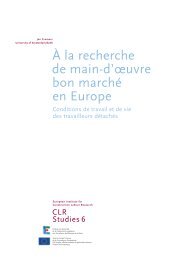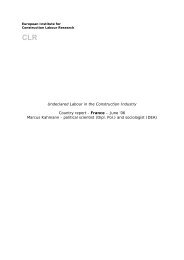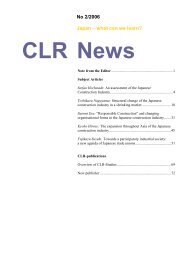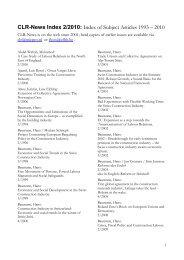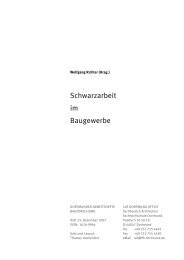SOLIDAR (2010): Social dialogue - Horus.be
SOLIDAR (2010): Social dialogue - Horus.be
SOLIDAR (2010): Social dialogue - Horus.be
Create successful ePaper yourself
Turn your PDF publications into a flip-book with our unique Google optimized e-Paper software.
11For reference to the Danish model and forfurther reading see <strong>SOLIDAR</strong> report onflexicurity and labour market inclusionservices, http://cms.horus.<strong>be</strong>/files/99931/MediaArchive/FIC-<strong>SOLIDAR</strong>-Seminar-Flexicurity-Report.pdf12http://www.ekspress.ee/2008/01/28/arvamus/812-muinasjutt-euroopalikusteelnoust“The European principleof flexicurity must <strong>be</strong> takeninto account, evenly balancingthe rights and obligationsof employees, employersand the Government.”<strong>Social</strong> Democratic Party of Estonia“Estonian labour legislationcan <strong>be</strong> transformed towardsflexicurity only if the legislatorshows more trust in theagreements <strong>be</strong>tween employeesand employer federations.”<strong>Social</strong> Democratic Party of EstoniaEstonia:Employment Contracts Act – the essential role of social <strong>dialogue</strong> in ensuringFlexicurityEstonia’s revised Employment Contracts Act (ECA) is an illustration of howignoring social <strong>dialogue</strong> can lead to serious failings. The ECA, which introducedthe notion of flexicurity into employment relationships, was initially based onthe successful Danish model 11 . Although Estonia’s draft legislation was drawnup on the basis of tri-partite negotiation, the final version ignored the views ofthe social partners, particularly the trade unions, and failed to provide workerswith any real security. The Danish model provides an income of up to 90% ofprevious earnings for the unemployed and includes, vitally, a high level ofinvestment in the workforce through education and life-long learning. Strongsocial <strong>dialogue</strong> is a key element of the system in Denmark, where 80% ofemployees are trade union mem<strong>be</strong>rs, and social partners were consulted ateach step of the reform. It was thanks to strong social cooperation that thereduction in unemployment brought about by these measures did not lead toa drop in wages. The Danish system provides both a sense of security for theemployee and for the economy’s competitiveness. The system has not workedso well when transferred to Estonia however, largely <strong>be</strong>cause some elementsare missing, due principally to a failure to respect social <strong>dialogue</strong>.Katrin Saks, one of the leaders of the Estonian <strong>Social</strong> Democratic Party, notesfor example that Estonia does not invest so heavily in adult education and lifelonglearning as Denmark does. Estonian statistics show that only 6-7% takepart in adult continuing education, which is one of the lowest figures in theEuropean Union 12 . The key roles of social <strong>dialogue</strong> and social partnership musttherefore <strong>be</strong> recognised as necessary preconditions to provide workers withsecurity and enable the flexicurity model to work. Issues related to labour lawand employment policy reforms should <strong>be</strong> resolved through tripartitenegotiations.13Domestic workers in Italy are representedby a num<strong>be</strong>r of trade union groups,namely: the Italian Federation ofCommercial, Tourism and ServiceWorkers (FILCAMS-CGIL), the ItalianFederation of Service, Commerce andTourism Workers (FISASCAT-CISL), theItalian Tourism, Commerce and ServicesWorkers’ Union (UILTuCS-UIL), andFEDERCOLF – Domestic Employees’Federation. Their counterparts on theemployers’ side are: FIDALDO – theItalian Federation of Domestic Employersand DOMINA – the National Associationof Domestic EmployersItaly:<strong>Social</strong> <strong>dialogue</strong> – a national collective agreement to protect care workersIn 2007 the social partners in the domestic and service sector - four trade uniongroups and two employers’ groups 13 - came together to negotiate a nationalcollective agreement for all domestic workers and family assistants, regardlessof their union mem<strong>be</strong>rship, giving them a legally recognised professionalstatus. The minimum wage for family assistants increased by an average of30% after the introduction of the collective agreement.The collective agreement that came into force on 1 March 2007 makes a cleardistinction <strong>be</strong>tween domestic workers and family assistants/carers. Theagreement divides the jobs into eight categories, specifying duties,qualifications etc. for each level, <strong>be</strong>ginning at the basic level A for domesticworkers with no experience. A salary level is assigned to each category whichthe parties cannot go <strong>be</strong>low, which is effectively a minimum wage set by thesocial partners for a specific professional group.10.




